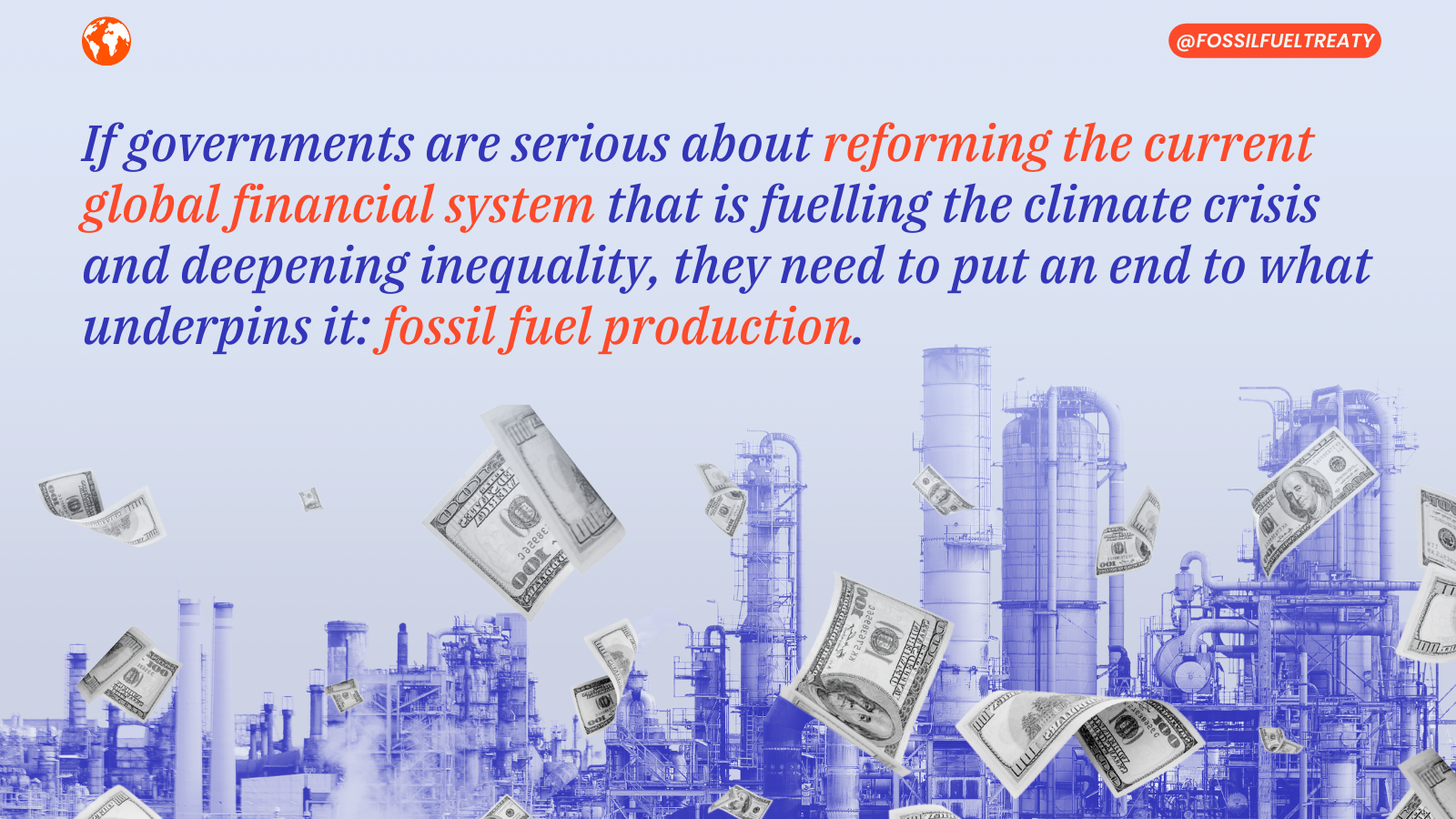A REAL NEW AND EQUITABLE PACT FOR GLOBAL FINANCE NEEDS TO TACKLE FOSSIL FUEL PRODUCTION
21 June 2023
21 June 2023 – The Paris Summit for a New Global Financing Pact - seen as a stepping stone behind the push to reform the global financial system - opens tomorrow with the stated aim of "laying the foundations for a new system that will meet our common challenges: tackling inequality, climate change and protecting biodiversity". The global financial architecture reform is supposed to make it fit to address the climate crisis and development challenges. However, fossil fuel production is not part of the agenda whereas the role of coal, oil and gas in the global economy is decisive.
Rebecca Byrnes, Deputy Director of the Fossil Fuel Non-Proliferation Treaty, said: “If governments are serious about reforming the current global financial system, they need to move to a truly radical transformation that prioritises a global just transition through new development pathways and tackling climate change at the source - that is, phasing out fossil fuels. The New Global Financing Pact Summit must shift the finance from the industries most responsible for our climate and inequality crises, and commit to mobilising the trillion of new, gran-based financing needed. A Fossil Fuel Non-Proliferation Treaty is the missing legal mechanism that can incentive and enforce the finance needed for a just transition away from destructive fossil fuel production.”
Harjeet Singh, Global Engagement Director at the Fossil Fuel Non-Proliferation Treaty, said: “Calls to reform the World Bank and the IMF are becoming ever more urgent and ambitious as this global financial system, established by Global North countries and primarily based on fossil fuel production, has proven to serve only their interests. Faced with the climate and development gaps that divide up our world a little more every day, it is crucial to revert the global financial architecture and make polluters pay for the damages they have been causing for decades. It is not about charity nor solidarity. It is about climate justice and that's what the Fossil Fuel Treaty is all about: breaking our dependence on fossil fuel production through a fair and sustainable financial system.”
A real pact for the future of global finance must address the 6 following demands:
Stop fossil fuel expansion and phase-out existing production:
Cement a global commitment for no more subsidies and no new financing for fossil fuels from all sources - public and private. Every actor at the Paris Summit should publicly state this commitment.
Develop a fossil fuel exit strategy for existing financial commitments to fossil fuel projects, including commitments to rehabilitation, remediation, and community and worker-led planning and delivery of just transitions.
Commit to clear financing windows for economic diversification in developing countries away from fossil fuel extraction and “leave it in the ground” incentives through just and equitable long term measures, including recommendations to global funds and multilateral financing streams.
Increase the liabilities and financial contributions from the sectors most responsible for the climate crisis including: a) Shipping and aviation levies, b) Fossil fuel extraction levies, c) International financial transaction taxes.
Agree to proposals for debt cancellation and debt justice to ensure the policy space for non-fossil fuel based development pathways and tackling climate impacts.
Launch negotiations for the development of new international governance mechanisms, such as a Fossil Fuel Non Proliferation Treaty, to provide coherence, guidance, accountability, and transparency to financing cooperation on the equitable exit from fossil fuels, including creating a Global Just Transition Fund.
Avoid locking in and promoting failed approaches of the past such as more debt-creating mechanisms, carbon-credits and privatised insurance schemes.
The Paris Summit will be a first step to build momentum towards a global financial transformation at key international governance gatherings where decisions will be taken, such as the next G20 Summit in India, and the COP28 conference in Dubai.
It is coming just a few days after, following a meeting with civil society climate leaders from across the world, the United Nations Secretary-General, António Guterres, described fossil fuels as incompatible with life. He called on all governments to phase out their production in order to ensure a future for our planet and humanity. On the same date, at the Bonn Climate Change Conference, climate justice movements joined voices and called for a global major mobilisation to fight fossil fuels in September.
In New York City and all corners of the globe, millions of people will take to the streets to #EndFossilFuels #FastFairForever.
For more information on the Fossil Fuel Non-Proliferation Treaty, visit our home page
Media ContactsViviana Varin
Senior Communications Campaigner, Fossil Fuel Non-Proliferation Treaty (France)
viviana@fossilfueltreaty.org, +33 6 63 48 52 67
Nathalia Clark
Communications Director, Fossil Fuel Non-Proliferation Treaty (Brazil)
nathalia@fossilfueltreaty.org, +55 61 99137 1229
